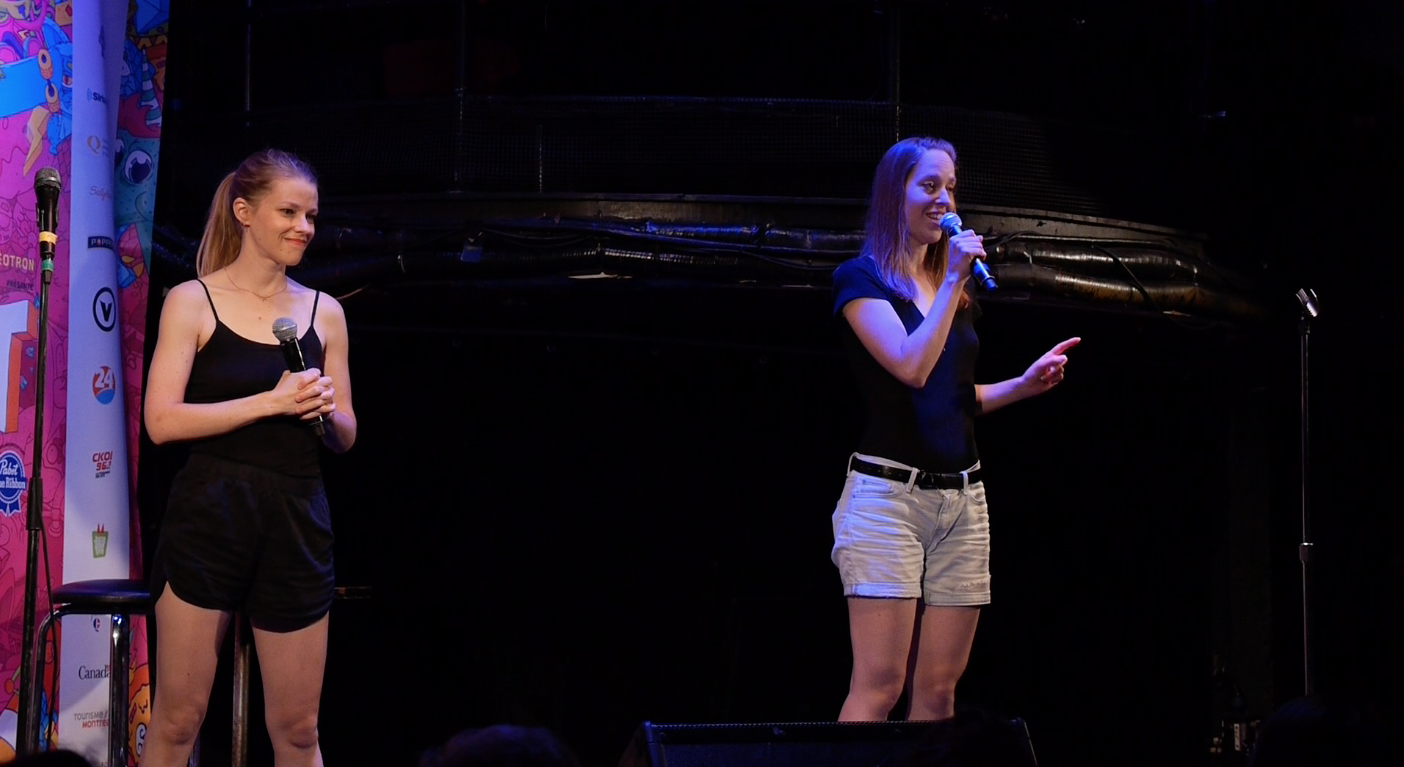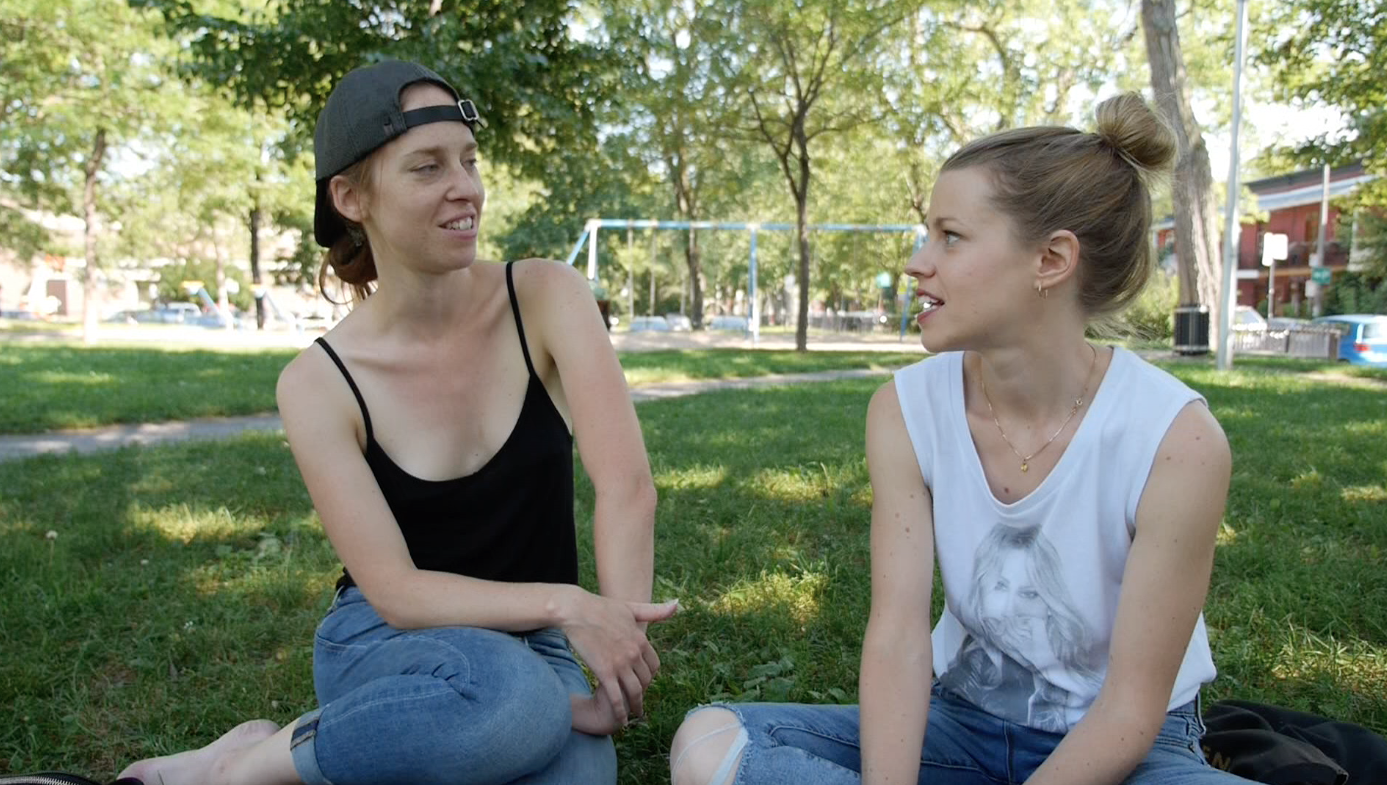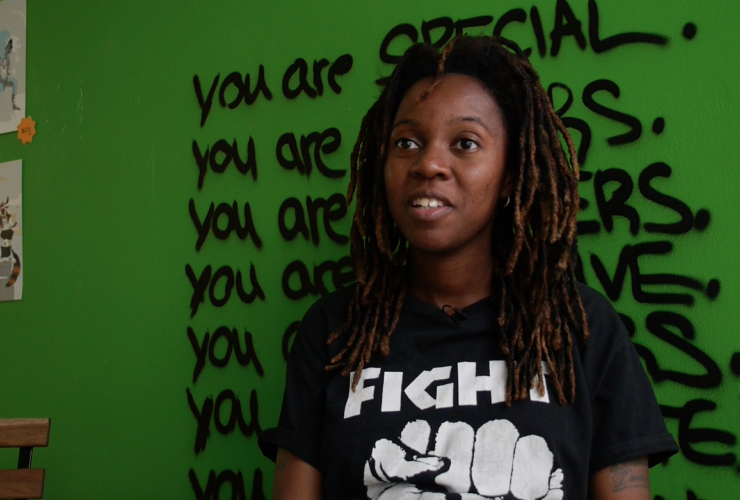The Sunday evening performance in Montreal begins with a satirical lesson on the politically charged 21st century 'social justice warrior.'
Quebec journalists Lili Boisvert and Judith Lussier hand-pick a definition from the work of a controversial “anti-feminist” American blogger, Roosh V, who says the only media outlet that has treated him fairly is Canada's Rebel Media.
Their voices drip with sarcasm as they share it with the audience.
“Social justice warriors believe in an extreme left-wing ideology that combines feminism, progressivism and political correctness into a totalitarian system that attempts to censor speech and promote fringe lifestyles while actively discriminating against men, particularly white men," reads Lussier straight off of her cell phone.
"That's us," quips Boisvert, sending the audience into fits of laughter. "Don't worry, you won’t find any white men here tonight. We’ve done some (racial) profiling."
For a year now, these two reporters have been filling halls in Montreal with their live performance, Le Social Justice Warrior Show. Attracting an audience of up to 100 people at a time, they use comedy to talk about taboo subjects, free from the restrictions of straight-laced journalism.
On the chopping block tonight are racism, white privilege, elitism and sexism. Watch below.
Two Montreal journalists moonlight as comedians to talk about racism, sexism and elitism, among other controversial topics. Their live performance, Le Social Justice Warrior Show, is a local smash hit. Video by Clothilde Goujard
Tackling taboos through comedy
Their approach seems to be working — comedy offers an informal and relaxed venue for taking on serious social issues, they say.
Boisvert and Lussier's live performances are in French, last up to an hour-and-a-half, and include cameos from four to five guests. They also have a 20-video web series that ran for 10 weeks starting in April. The latter has become a local sensation, and has already been approved for a second, funded season with local broadcaster Télé-Québec.
The pair's Facebook page has attracted more than 28,000 likes from Montreal to Europe. The key to their success, they say, is reaching a millennial audience through social media, using memes, Facebook, and status updates.
“We knew we wanted (to talk) about feminism, anti-racism, Islamophobia and to have a different tone than traditional media, a tone that’s more engaged — less like journalists, distant and above their topics,” Boisvert told National Observer after a recent performance.
The term 'social justice warriors' is generally used by Internet trolls as an insult, "but we find the expression badass,” she added.
The partnership began when Lussier and Boisvert first met in 2014. Lussier is a freelance journalist and radio host whose work has been published in Urbania, Elle Québec and Journal Métro, and Boisvert is known for her work on Urbania and Radio-Canada, for which she wrote a regular sex blog).
They realized they shared common interests and decided to work together to share their views with the public. Two years later, they launched their a series of short, comedic online videos called Les Brutes, which in English, means beasts or bullies.
Lussier and Boisvert said the name refers to their determination to "overthrow" the prevailing mentality and "smash the patriarchy."
When they started the series, they said they were bothered by the fact that they seldom saw women, especially young ones, expressing their opinions about complex societal issues in mainstream media. They used comedy as a gateway for discussing controversial topics like cultural appropriation, race, and rape culture.
“We would go to broadcasters and we thought, ‘We’re going to tell them it’s feminist but we’ll say it’s going to be funny.’ It was to reassure them a bit. ‘We promise it won’t be heavy,'” Lussier recalled.
They anticipated it would be difficult to get their message across as women. Research has documented how women who are seen as assertive are judged harshly, particularly in the workplace. In the office, double standards lead to labels like "bossy," while in the public sphere, strong female leaders and politicians may be seen as too aggressive.
“When you’re a woman, you can’t be too assertive and put yourself forward," said Boisvert. "It doesn’t look good, so humour more or less allows us to solve this perception problem women have when they express their opinions."
Nevertheless, their project attracted the attention of Télé-Québec, which funded it as a web series that has been renewed for a second season coming this week. The videos are available on the broadcaster's website and on social media.
Their success prompted a venue in Montreal to offer them a free room for a live trial performance. They seized the opportunity, recruited other like-minded comedians and together, gave birth to “Le Social Justice Warrior Show." Boisvert and Lussier are planning on holding another performance in the fall to meet the rising demand for their comedy.
Yes, comedians have rules
While Lussier and Boisvert generally consider themselves light and funny, they sometimes resent the need to use humour to speak about complicated issues.
“There are things that infuriate us, and it would be legitimate for us to be serious and do serious and heavy videos (about them), except that we are aware that we (live) in a world where we’d lose 80 per cent of people if we did that,” said Lussier.
Their video about rape culture for instance was particularly difficult to create. They spent time brainstorming, writing, shooting and then decided to start their video from scratch again. Eventually, they settled on a Q&A format of asking Montreal residents to comment on "absurd" preconceived ideas about rape. They asked, for example, if a woman could prevent rape by keeping her knees together. Shocked, everyone said that wouldn't work. Then they explained to viewers that in a 2014 Alberta court case, disgraced former judge Robin Camp asked a sexual assault complainant why she hadn't done just that.
Their only rule is to not be the main hosts of performances and videos when the issue doesn’t personally touch them. A successful example is their video featuring Dalila Awada, a Quebec columnist and sociologist, who asked them questions she is frequently asked as a Muslim, like whether she would like to condemn the action of Islamist terrorists. The video was viewed 156,000 times.
At their comedy show on Sun. July 23, Montreal comic Preach joked about the racist comments he gets on his videos telling him to go back home. The former doorman of a Montreal comedy club venue makes bilingual comedic videos with his friend Aba, which poke fun at everything from their dislike of Céline Dion to what they believe was a lack of diversity during Montreal's 375th anniversary.

Journalists Judith Lussier (left) and Lili Boisvert did their first "Le Social Justice Warrior Show" in 2016 after launching a successful comedic web series called Les Brutes. They are pictured here at a July 23, 2017 performance of their smash hit live sketch routine. Photo by Clothilde Goujard
More diversity needed in comedy
Lussier and Boisvert believe there is a real need for more diversity in comedy, which is why they frequently invite guests to participate in their live performances and videos. Lussier remembers going to a show last year featuring six comedians, all men between the ages of 35 and 40, and five of them white.
“Three had a skit about going back to the gym, four had a skit about going apple-picking since it was in the fall, and one had a skit about going pumpkin-picking," she recalled. "And basically, their girlfriends had forced them to go apple-picking and they were so unhappy to be such victims of (their girlfriends).
“At one point, if you give a voice to the same people, they’re going to talk about the same things. And what is interesting in our show is that there’s not one same person. We always have guests with very different discourses who come from really different backgrounds and yet we manage to have a feeling of cohesion. In everyone’s marginality, we end up finding ourselves."
For Boisvert, although there are some politically active comedians in Quebec, she believes they spend too much time focusing on individual politicians instead of looking at systems of power more broadly.
“It’s about going beyond (individual politicians) and looking at social problems. Power is not just found at the national assembly,” she said.
But it’s often harder to criticize society broadly and to look at our own biases and prejudices, Lussier added.
“There are people who are not comfortable laughing at themselves, laughing about their own society’s problems,” she explained. “We can feel it when there’s (an announcement) about a commission on systemic racism. People immediately jump, ‘Oh no, Quebecers, we’re not racists.’
"So it’s not accessible to all to be able to laugh about our problems. But I think there’s an audience and I think millennials are ready to take the time to think (about societal problems).”
The pair said people who watch their videos and come to their shows aren’t necessarily politically and socially engaged, but are willing to think about complex issues like privilege based on race, gender and sexual orientation. They even know parents who watch their videos with their teenage kids to start discussions.
They are also surprised by the diversity their audience at live shows.
“We realize there are more men (coming to see our show) than we’d thought,” said Lussier, admitting that their joke about finding a white man in their audience doesn’t work as well anymore because, sometimes, almost half of the audience is composed of them.






Comments